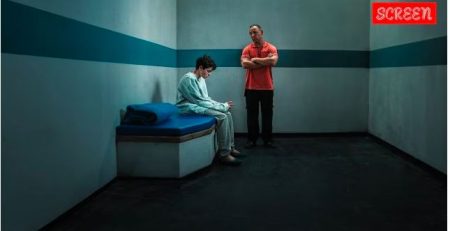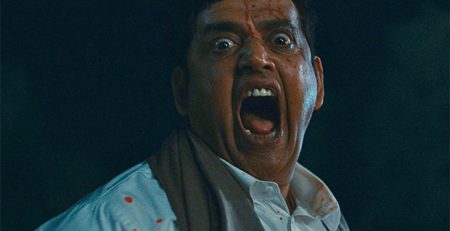Toxic Town: Tremendous Netflix series is a reminder of just how problematic mainstream Indian filmmaking is
Share this post
Hurl a rock in the air and it’ll probably hit a mainstream Indian film that lacks a clear perspective. In fact, most of them are objectively misguided. The romantic drama Satyaprem Ki Katha was told from the male character’s point-of-view, when it is actually the woman’s story. As was last year’s terrible Netflix film Maharaj, and virtually every movie that Nitesh Tiwari has directed. Not a single person behind the film Sirf Ek Bandaa Kaafi Hai, meanwhile, recognised the irony in giving this title to a story about a wronged woman. The prolific writer Jack Thorne might’ve had similar concerns while plotting Toxic Town, a new Netflix mini-series about a horrific case of bureaucracy and red tape.
He could’ve told the story from the perspective of the righteous whistleblower who refused to be compromised by the system, or the courageous middle-manager whose morality wouldn’t allow him to turn a blind eye to the crimes unfolding around him, or even the brave lawyer who fought for justice at tremendous personal cost. But fortunately — and this is the difference between a smart writer and an unintelligent one — Thorne made the correct decision to revisit these crimes through the perspective of the women who were most affected by them. In the mid-90s, several women in the British town of Corby gave birth to children with physical differences. The town was established for steel workers employed at a nearby plant, similar to how the town of Chernobyl was created for the workers at the nuclear facility. When the steel plant was shut down, the government tasked local authorities with a hasty redevelopment project. They cut corners, and allowed toxic waste to spread across Corby, infecting every inhabitant and, most tragically, expectant mothers and their unborn children.
Also read – IC 814 The Kandahar Hijack: In the best Indian show of the year, Anubhav Sinha puts ‘babugiri’ on blast
toxic town A still from Netflix’s Toxic Town.
Thorne makes the smart decision to devote the entire first episode — there are only four in total, thankfully — to introducing and establishing our central characters. Jodie Whittaker plays Susan, a young woman whose second son is born with an improperly developed hand. Aimee Lou Wood stars as Tracey, whose infant daughter Shelby Ann dies due to severe health complications. Both women deal with the tragedies in different ways; while Susan steps up and dedicates herself to giving her kids a normal life, Tracey slips into a depression. It is only many years later, after a journalist begins poking into the matter, that they discover what really happened to them.
In comes Des Collins, an earnest lawyer played by Rory Kinnear. Des promises to do right by the women, and is encouraged by the leaked evidence supplied to him by a middle-aged man who used to work at the town council. Played by Robert Carlyle — the UK’s answer to Willem Dafoe — the character could’ve very easily been the protagonist of Toxic Town, considering the crucial role that he plays in connecting all its different strands together. But it’s the women who take centre stage, and rightly so. Des presents them with four challenges that they must overcome. They must prove that they were exposed to toxic waste, that the waste was poisonous enough to affect their children, that the council was aware, and lastly, that it was negligent.
Although it borrows heavily from HBO’s Chernobyl, Toxic Town charts its own creative path. For one, it isn’t as dour as that show; it’s a crowd-pleasing call-to-action. Susan is an easy character to get behind, and while the script sort of manipulates you into feeling for her — Susan’s husband walks out on her shortly after the birth of their second son — it also does the due diligence of giving her enough to do beyond the requirements of the primary plot. Her mental illness is hinted at, as is her alcoholism. Both these points are brought up by the defence during the trial in episode four, but by then, you’re willing to take up arms on Susan’s behalf.
You can tell that the show has its heart firmly in the right place when it decides devote a chunk of screen time to a difficult moral decision that Des is forced to make. On an expert’s recommendation, he tells Tracey that she cannot be listed as one of the complainants. Because her daughter died, it would reduce the chances of a victory for the women. A lesser show would’ve ignored this bit altogether, but Toxic Town wants to convey just how emotionally taxing this case was to the people who fought it. They weren’t just taking on the corrupt council, but also their own belief system.
toxic town 4 A still from Netflix’s Toxic Town.
Toxic Town cleverly charts the passage of time by highlighting not just the evolution of technology — landlines are replaced by iPhones in the decade and a half that it takes for the women to get justice — but also by the language with which the children are spoken about. The same people who would use words such as ‘disability’ and ‘deformity’ in conversations about the kids begin talking about them as ‘differently abled’ as the years go by. The show doesn’t underline these ideas too pointedly, but it’s one of the many ways in which it communicates just how long the women (and children) had to fight.
Shows like Toxic Town offer a rather sobering reminder of how disinterested our film industries are in exploring stories such as this. Forget making a film or TV series about the state machinery’s inability to curb pollution in Delhi or the municipality-level mismanagement in Mumbai, our filmmakers would rather tell the same stories from the government’s point-of-view. We’ll probably never see an honest show about how the pandemic was handled, but someone certainly made a film about how Indian vaccines saved the world.












Leave a Reply